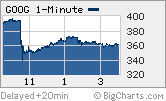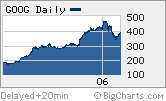|
Google: Too much information?
The stock tumbled Tuesday after CFO warned of slowing growth. But Wall Street still wants more details from the company at its analyst day.
NEW YORK (CNNMoney.com) � Google can't win. The search engine is often criticized for not giving Wall Street enough information. But when it does open up, investors often don't like what they hear. Shares of Google (Research) plunged 7 percent Tuesday after Google chief financial officer George Reyes, speaking at a Merrill Lynch Internet conference, said that growth was starting to slow in search. "Most of what is left is just organic growth," said Reyes. "Clearly our growth rates are slowing. We see that each and every quarter. We are going to have to find new ways to monetize the business."
The stock bounced back slightly on Wednesday. But since Google reported fourth-quarter earnings that missed Wall Street forecasts last month, its first miss since going public in August 2004, the stock has tumbled more than 15 percent and Wall Street has become more skeptical of just how strong Google's growth will be going forward. That makes Google's annual analyst day on Thursday even more crucial. Wall Street is hoping that the company may be a little more forthcoming, particularly about its finances, than it has been in the past. The company famously refuses to provide earnings or sales targets. But analysts aren't holding their breath. "They have a history of not really providing much in the way of financial data," said Steve Weinstein, an analyst with Pacific Crest Securities. "There are things I'd love to hear but that we are unlikely to hear." Yet it may be in Google's best interests to give Wall Street more information. Investors have also become more concerned about competition from the likes of Yahoo! (Research), Microsoft's (Research) MSN and the recently redesigned Ask.com, owned by IAC/InterActive. (Research) Late on Tuesday, Google said that the company sees plenty of room to improve on how it makes money selling advertising alongside its popular Web search results, clarifying Reyes' statements. "We still see significant opportunities to improve monetization and intend to continue to focus our efforts in this area," the company said in a statement. There have also been increased worries about click fraud -- illegal practices used to bilk marketers by fraudulently increasing traffic figures for banner ads and sponsored links -- and whether that may dampen companies' desire to advertise online. With that in mind, analysts said they are eager to hear about how Google plans to tackle increased competition and click fraud. "This is a very important analyst day. Everyone is hoping to get more disclosure out of them but we're probably not going to get anything," said Sasa Zorovic, an analyst with Oppenheimer & Co. "But the difference will be is that the audience will be less Googly-eyed than they were last year." What else are analysts interested in learning from Google? Mark Mahaney, an analyst with Citigroup, wrote in a report Monday that the biggest question investors have for Google is about spending, namely how much the company plans to invest this year on new products and possible acquisitions and what that means for earnings. Google has aggressively rolled out new features during the past year, such as its Google Base classified service and a Google video search and store. It has also done some deals to get into new markets, such as the purchase of privately held dMarc Broadcasting, which places ads at radio stations. Mahaney thinks Google will spend more than $1 billion in capital expenditures in 2006. He's hoping to get some indication from management about whether this estimate is on target or not. "Our investment assumptions are aggressive. Given the lack of guidance, what we don't know is whether they are aggressive enough. This is probably the single biggest takeaway we'll be hoping to discern from management comments at the analyst day," Mahaney wrote. Zorovic said analysts are also curious about what new products or features Google may unveil during the analyst day. For example, there are rumors that Google may launch a finance site similar to that of Yahoo!'s. Zorovic added that the company needs to give Wall Street more details about how Google intends to crack the so-called "display advertising" or "branded advertising" market, offering banner ads that feature video and animation. So far, Google relies mainly on search-based advertisements -- companies paying to get their ad tied to specific keyword queries -- but Zorovic said that display advertising could be a "phenomenal money generator" for Google. And in December, when Google announced that it was investing $1 billion for a 5 percent stake in AOL, the online portal owned by Time Warner (Research), Google said that it planned to expand its display advertising business. (Time Warner also owns CNNMoney.com.) International expansion is also expected to be a hot topic during the analyst day, particularly the issue of China. Google has been criticized by some for agreeing to censor certain search results on its Chinese Web site at the behest of the Chinese government. Several Google competitors have taken similar actions in order to do business in China. This controversy is likely to be addressed during the call. But Pacific Crest's Weinstein said he's most interested in hearing more about overall pricing trends internationally. He said that the majority of Google's click volume comes from international markets but that the bulk of its revenue still comes from the U.S. But even after Reyes' comments Tuesday, some think Google still kind of resembles the CIA and the Kremlin in their Cold War heyday ... except that Google is even more tight-lipped than those spy agencies ever were when it comes to secrets. "Provide some more information for goodness sake," Oppenheimer's Zorovic said. "No guidance doesn't help anybody. Of course people are going to be in the dark." For a look at why Google is on the defensive, click here. Does Yahoo! have the biggest China problem? Click here. Analysts quoted in this story do not own shares of Google. Citigroup has done investment banking for Google but the other firms do not have banking relationships with the company.
The reporter of this story owns shares of Time Warner through his company's 401(k) plan. |
| ||||||||||||||||||||||||||||||||||||||||||||||||||||||||||




